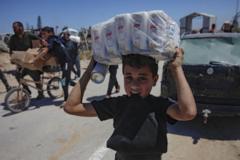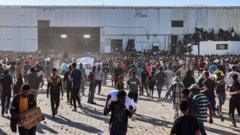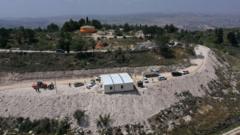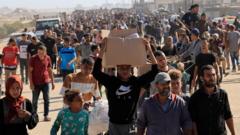International condemnation grows over Israel’s handling of humanitarian assistance in Gaza, raising questions about future aid strategies.
**Israeli Aid Initiative in Gaza Sparks Chaos and International Outcry**

**Israeli Aid Initiative in Gaza Sparks Chaos and International Outcry**
A controversial aid program backed by Israel met with disorder as Palestinians rush for supplies, igniting criticism from global bodies.
The United Nations has openly criticized Israel’s latest humanitarian aid initiative in southern Gaza, following a tumultuous launch that saw thousands of desperate Palestinians swarm a food distribution center in Rafah. Israeli forces fired warning shots to manage the crowd, escalating tensions amid a tailored operation aimed at undermining the authority of Hamas.
The initiative, called the Gaza Humanitarian Foundation, seeks to provide aid while bypassing both the United Nations and Hamas, but this approach has sparked outrage from various humanitarian organizations and more traditional partners of Israel. They express concerns about the adequacy and impartiality of the operation, especially as Israel faces increased scrutiny regarding its military actions and threats against Hamas following a recently lifted humanitarian blockade.
European Union's chief diplomat, Kaja Kallas, stated that "the disproportionate use of force and the deaths of civilians cannot be tolerated," emphasizing that humanitarian aid should remain neutral and free from political manipulation. Israeli authorities contend that the program is necessary to ensure aid reaches those in need, as previous systems allowed Hamas to intercept supplies.
Under the new scheme, Israeli troops secure four aid distribution sites across southern Gaza, overseen by private American contractors, marking a significant shift from the previously UN-led operations. Israeli leaders criticize the UN for perceived biases and alleged failures in delivering aid directly to those who truly require it, fueling further regional tensions.
The initiative, called the Gaza Humanitarian Foundation, seeks to provide aid while bypassing both the United Nations and Hamas, but this approach has sparked outrage from various humanitarian organizations and more traditional partners of Israel. They express concerns about the adequacy and impartiality of the operation, especially as Israel faces increased scrutiny regarding its military actions and threats against Hamas following a recently lifted humanitarian blockade.
European Union's chief diplomat, Kaja Kallas, stated that "the disproportionate use of force and the deaths of civilians cannot be tolerated," emphasizing that humanitarian aid should remain neutral and free from political manipulation. Israeli authorities contend that the program is necessary to ensure aid reaches those in need, as previous systems allowed Hamas to intercept supplies.
Under the new scheme, Israeli troops secure four aid distribution sites across southern Gaza, overseen by private American contractors, marking a significant shift from the previously UN-led operations. Israeli leaders criticize the UN for perceived biases and alleged failures in delivering aid directly to those who truly require it, fueling further regional tensions.





















